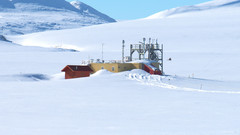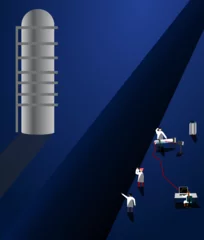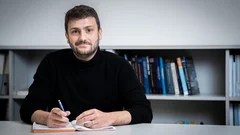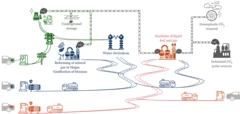News & Highlights
Rescuing Earth’s icy memory
An international research team with PSI participation is rushing to preserve glacier ice for posterity.
Scientists map Arctic aerosols to better understand regional warming
In order to better understand climate change in the Arctic and design effective mitigation measures, scientists at EPFL and PSI have studied the aerosols in a region spanning from Russia to Canada.
New Head of Laboratory for Energy Systems Analysis (LEA)
As of February 1st 2022, Russell McKenna joins the Paul Scherrer Institute’s Laboratory for Energy Systems Analysis (LEA) as head of the Laboratory. The position at PSI and the full professorship at ETHZ will enable him to combine his research with teaching activities. This optimally reinforces the cooperation between ETH Zurich and the two energy sectors, ENE and NES, of the PSI.
Optimization of catalyst performance to increase efficiency of methanol production
Many types of catalysts have been well known for decades, but the fundamental understanding as to why they work so well is still not quite clear. Without this understanding, an even more efficient catalyst cannot be developed, which is needed to reduce the global energy demand. Copper-zinc-alumina (CZA) is a popular catalyst and has been used for about 100 years, as it facilitates the production of the important chemical building block methanol, a molecule that enables the storage of hydrogen in a manner that minimizes negative impact on the carbon-dioxide footprint. Until 2021, scientists debated over the reason why the catalyst works so well. Understanding the reason behind this is vital in order to further develop even better ones. The copper-zinc-alumina (CZA) catalyst is assessed at the Laboratory for catalysis and sustainable chemistry (LSK) of the Paul Scherrer Institute.
Andrea Baccarini, former member of the Laboratory of Atmospheric Chemistry, awarded the ETH Medal for his PhD thesis
Andrea Baccarini, a former PhD student at the Laboratory of Atmospheric Chemistry, has been awarded the ETH Medal for his thesis investigating aerosol formation in the Arctic and Antarctic and the role aerosols play in climate change.
Asthma: diagnosis in a single breath
PSI is involved in the development of a breath test that can be used to diagnose asthma. Imad El Haddad explains why such a test could be extremely useful – especially for children.
E-fuels and electrification as complementary approaches to achieve climate target
Sustainable, synthetic fuels, so-called e-fuels, can help reduce CO₂ emissions. For their production, electricity from renewable sources is required in order to allow for a close to CO₂-neutral balance. The availability of electricity from renewable sources, which ensures the climate benefits of e-fuels, is currently still limited. “Especially in order to produce on a larger scale, a lot of renewable electricity is needed,” explains Christian Bauer, researcher at the Laboratory for Energy Systems Analysis (LEA) at PSI.
LAC scientists awarded Mariolopoulos Trust Fund Award 2022
The paper "Sources of particulate-matter air pollution and its oxidative potential in Europe" published in Nature by Kaspar Dällenbach and his team at the LAC has won the 2022 Mariolopoulos Trust Fund Award, along with another paper in the field of atmospheric environment.
"I could not imagine a better place to have done a PhD"
Bernhard Pribyl-Kranewitter, former PhD student at the Energy and Environment Division, shares with us a glimpse of his time at the Paul Scherrer Institute and where his path has led him. Currently, he works as a senior consultant at Kearney.







